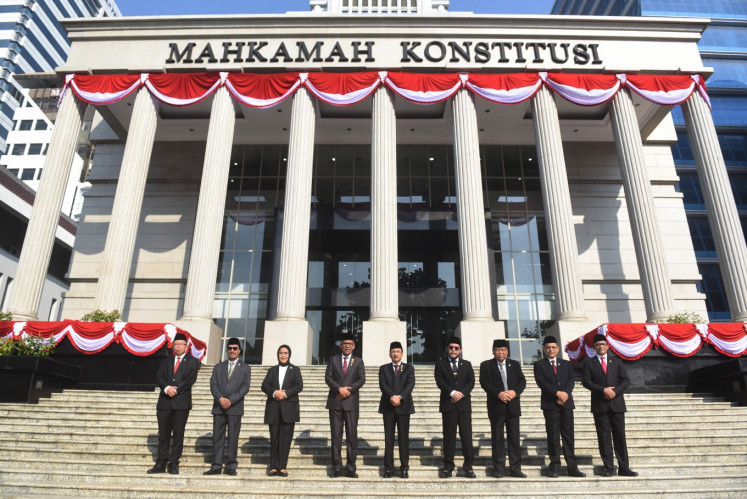Popular Reads
Top Results
Can't find what you're looking for?
View all search resultsPopular Reads
Top Results
Can't find what you're looking for?
View all search resultsSpeak Mandarin, will study
Why study in Taiwan? That was the first question that came to mind when I came across a group of Indonesians studying at the National Taiwan Normal University (NTNU)
Change text size
Gift Premium Articles
to Anyone

W
hy study in Taiwan? That was the first question that came to mind when I came across a group of Indonesians studying at the National Taiwan Normal University (NTNU).
Indonesian students: Tsung-Rong Edwin Yang (second left) of the National Taiwan Normal University poses with Indonesian students. His passion, he says, is to promote greater academic contacts between Indonesia and Taiwan. JP/Endy M. Bayuni
They came up with several different answers.
“It is safe here,” Susanti Djie, who is studying Chinese language and culture, says promptly. “And there is freedom,” she adds, without elaborating whether she was comparing Taiwan with Indonesia or with mainland China.
“I like the international environment here,” says Alice Jennifer, referring to the strong presence of students from around the world at the university’s Mandarin Training Center.
Of course, studying Mandarin is a prerequisite for anyone intending to tap the best of Taiwan’s academic excellence, of which there are many options.
Mimy Tjong Mui Thin, a graduate student at the NTNU Institute of Teaching Chinese as a Second Language, says many Indonesians chose Taiwan over mainland China because the Mandarin spoken here was still in its original form and not corrupted as much by contemporary usage. “That makes it easier to learn,” she says.
Alice says the tuition fees in Taiwan were reasonable and universities here charged the same rate for foreign students as well as locals. “We don’t feel discriminated against.”
While scholarships may be hard to come by if you are in Jakarta (the Taiwan Economic and Trade Office, or TETO, does provide limited numbers), Indonesian students say the university and the different departments also provide scholarships and financial assistance, depending a lot on scores.
“It’s a question of finding your way around here,” Mimy says.
“And you can work part time here while studying to earn some pocket money,” Susanti says.
Unbeknownst to the Indonesian government, there are 3,000 Indonesians currently studying in Taiwan, a number that surprised Harmen Sembiring, the new chief representative of the Indonesian Economic and Trade Office in Taipei.
“They are not required to register with our office, but they do register with the association of Indonesian students,” Harmen says, explaining the source of his figures, which he calls believable.
Tsung-Rong Edwin Yang, associate professor at NTNU’S College of International Studies, believes that there should be more exchange of students and academics between the two nations.
“We are not doing enough people-to-people contact. An exchange of academics would be great,” he said.
Yang, who takes pride in wearing his Indonesian batik shirt, is helping universities in Indonesia set up Mandarin language training programs.
He says his real dream was to set up an Indonesian language center at the NTNU, something he believes would further enhance cultural ties between Indonesia and Taiwan.
“I already have Mimy and Lily to help teach Bahasa Indonesia,” he says. The latter is Lily Sagita, a professor from the University of Indonesia in Jakarta who is currently completing her doctorate at the Department of Human Development and Family Studies at the NTNU.









